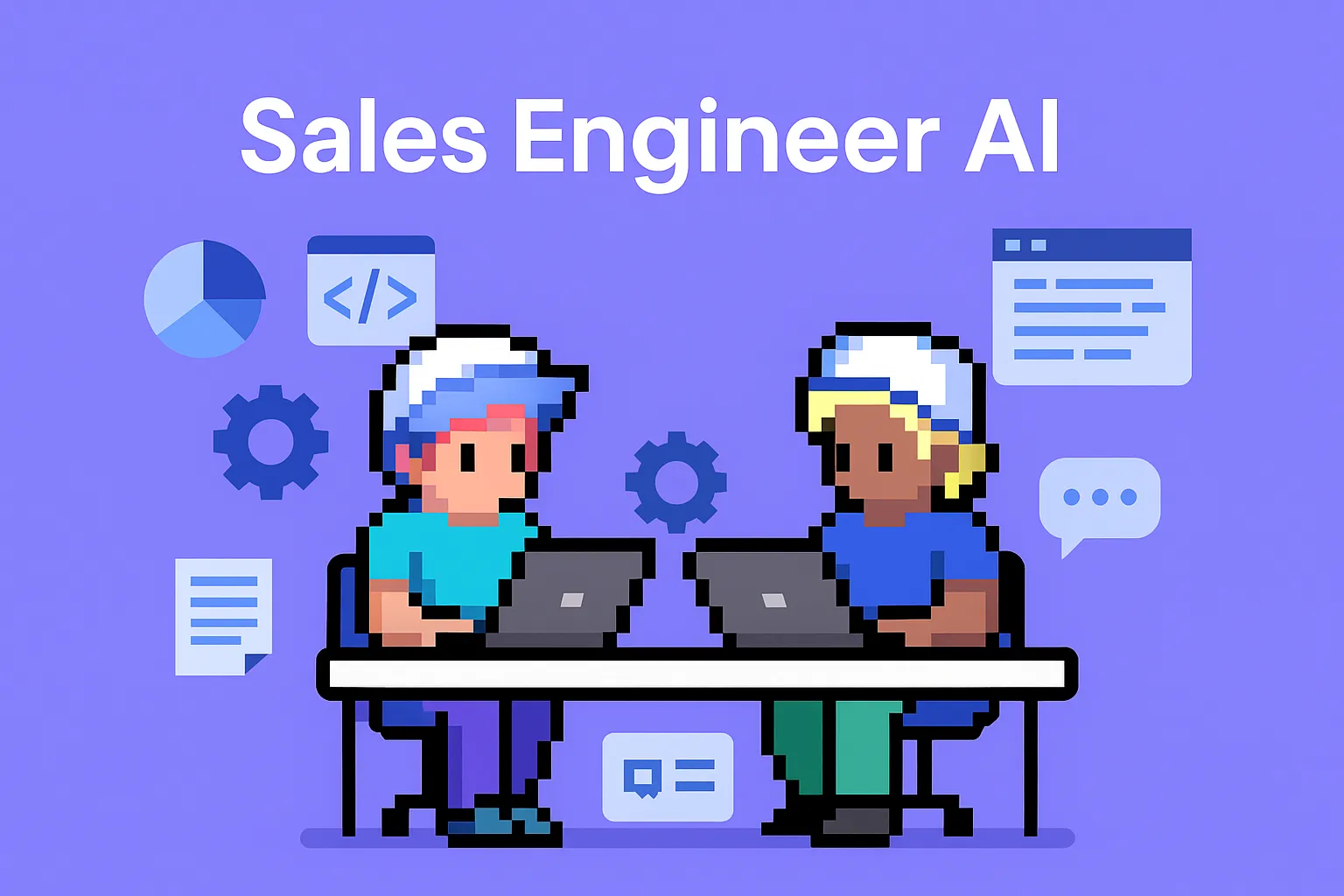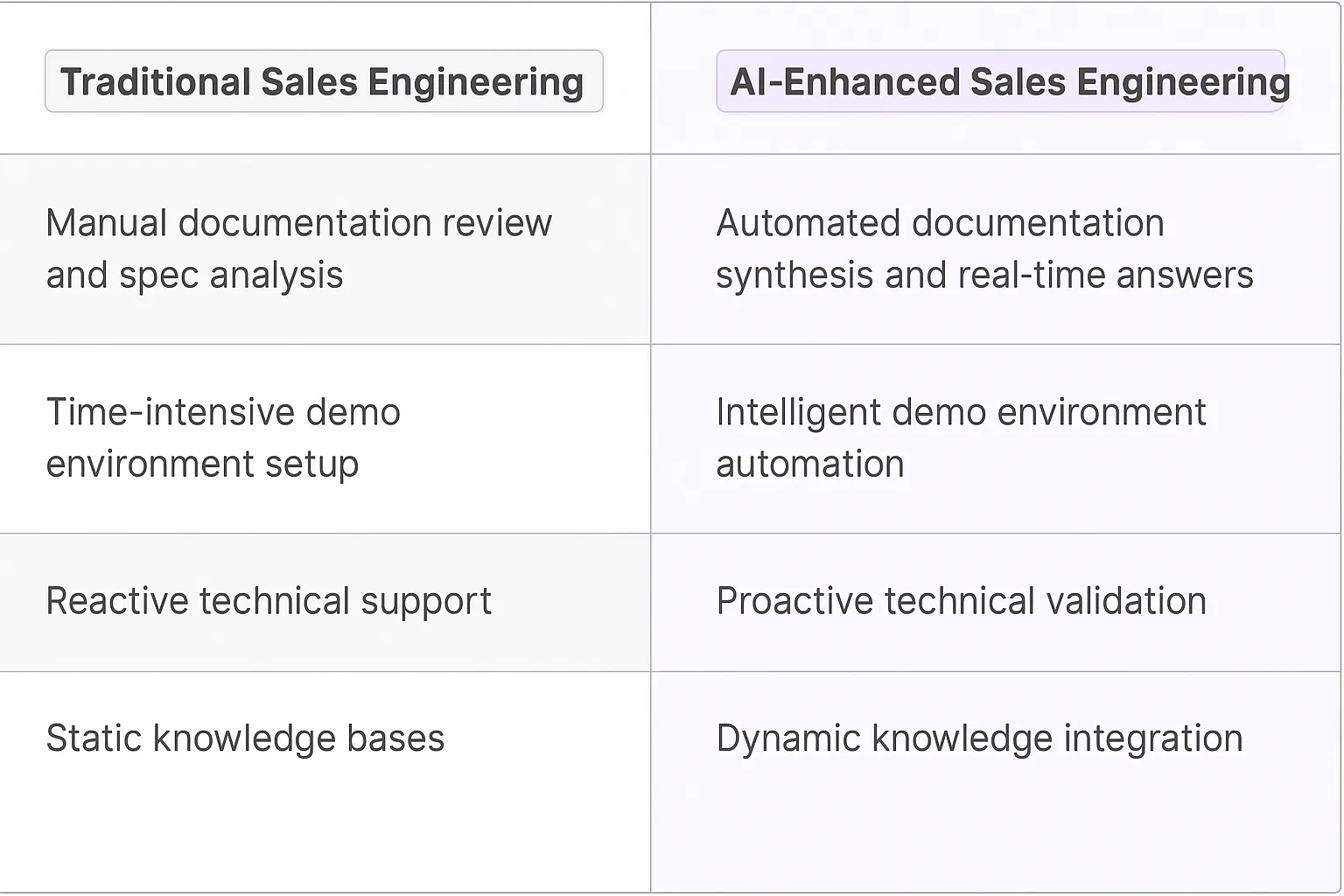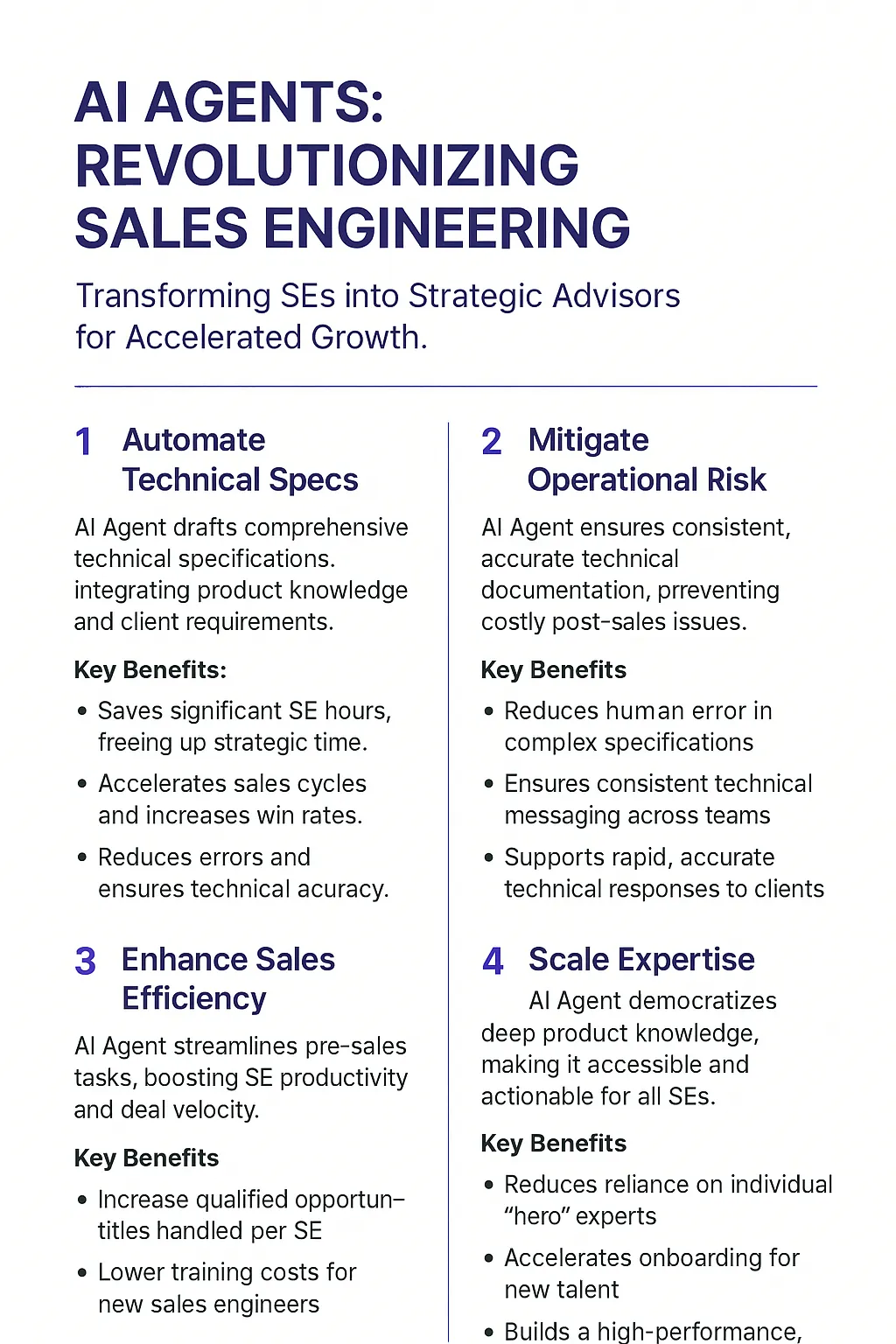A Sales Engineer AI Agent is a specialized digital teammate that combines deep technical knowledge with advanced natural language processing to support technical sales processes. These agents act as force multipliers for Sales Engineering teams by processing vast amounts of technical documentation, automating routine technical tasks, and providing real-time support during customer interactions.

Sales Engineers traditionally relied on a complex stack of disconnected tools: static documentation repositories, knowledge bases that quickly became outdated, and endless email threads trying to get technical answers from product teams. They'd spend hours manually preparing technical specs, digging through Git commits for feature details, and cobbling together custom demos. The cognitive load was intense - they had to simultaneously master the product, understand customer use cases, and maintain technical accuracy in every interaction.
Digital teammates fundamentally transform how Sales Engineers operate through deep product knowledge integration and real-time technical support:
The network effects are particularly powerful here - as more Sales Engineers interact with these AI Agents, the knowledge base becomes richer and more nuanced, creating a compounding advantage for the entire sales engineering organization. This is a classic example of software eating the world - taking a traditionally high-touch, expertise-driven function and augmenting it with scalable AI capabilities.

Sales Engineers face unique challenges bridging technical complexity with customer needs. AI agents serve as digital teammates that enhance technical sales processes while maintaining the human elements that drive successful customer relationships.
The integration of AI agents into sales engineering transforms the pre-sales technical process. Instead of spending hours manually reviewing documentation or preparing custom demos, Sales Engineers can focus on high-value activities like strategic solution design and building customer relationships.
For example, when a Sales Engineer receives a complex RFP, their AI teammate can analyze the technical requirements, flag potential challenges, and suggest relevant case studies - all while the SE focuses on crafting the strategic approach to win the deal.
The effectiveness of AI agents in sales engineering can be measured through several key metrics:
When implemented thoughtfully, AI agents become invaluable members of the sales engineering team, handling time-consuming technical tasks while enabling SEs to focus on strategic customer engagement and complex problem-solving.

The versatility of AI agents in Sales Engineering creates powerful opportunities across multiple sectors. Sales Engineers face unique challenges - they're part technical expert, part relationship builder, and part problem solver. AI agents act as digital teammates that enhance these roles in specific, measurable ways.
Technical sales requires deep product knowledge, quick responses to complex questions, and the ability to translate technical specifications into business value. AI agents excel at processing vast amounts of technical documentation, product specs, and customer requirements to support Sales Engineers in delivering precise, contextual solutions.
What's particularly fascinating is how AI agents adapt to different industry contexts. In enterprise software, they help Sales Engineers parse through extensive API documentation and integration requirements. For hardware manufacturers, these digital teammates assist in configuring complex product specifications and compatibility matrices. In cloud services, they support modeling various deployment scenarios and calculating resource requirements.
The real power emerges when examining how these use cases compound over time - each interaction builds upon previous knowledge, creating an increasingly sophisticated support system for Sales Engineering teams.
The manufacturing equipment sales cycle has always been a complex dance of technical knowledge, relationship building, and precise solution mapping. I've spent time analyzing how AI agents are creating a fundamental shift in this space - not by replacing sales engineers, but by becoming their digital teammates in the trenches.
A manufacturing sales engineer AI agent can process thousands of technical specifications, compatibility requirements, and historical performance data in seconds. When a potential client inquires about a new CNC machine for their aerospace parts production, the AI agent immediately pulls relevant case studies, identifies potential integration challenges with their existing setup, and generates customized ROI calculations.
What's fascinating is how this changes the sales engineer's approach to client meetings. Instead of spending hours preparing technical documentation, they can focus on understanding the client's unique manufacturing challenges and future growth plans. The AI agent handles the heavy lifting of technical validation, allowing the sales engineer to elevate the conversation to strategic business outcomes.
One manufacturing equipment company reported a 40% reduction in their technical validation phase after implementing AI agents. Their sales engineers now spend more time on high-value activities like customization discussions and implementation planning. The most interesting metric? Deal sizes increased by 23% because sales engineers could focus on solving bigger, more complex problems rather than getting bogged down in technical minutiae.
This shift represents a new paradigm in technical sales - one where AI agents handle the computational complexity while human sales engineers leverage their industry expertise and relationship-building skills to drive better outcomes. It's not about replacing the sales engineer's expertise; it's about amplifying their ability to deliver value in every client interaction.
I've been tracking an interesting transformation in healthcare technology sales, where AI agents are fundamentally changing how sales engineers operate in this highly regulated and complex environment. The intersection of medical device expertise and AI capabilities is creating a new playbook for sales effectiveness.
When selling advanced imaging systems or robotic surgical equipment, sales engineers face unique challenges - from strict compliance requirements to intricate technical specifications. AI agents now process vast databases of clinical studies, regulatory requirements, and hospital-specific protocols, providing sales engineers with precisely tailored information during critical conversations.
A fascinating case I observed involved a leading medical imaging company. Their sales engineers integrated AI agents that could instantly analyze a hospital's patient flow data, existing equipment specifications, and space constraints. During presentations, these digital teammates generated real-time responses to technical queries about radiation dosage optimization, integration with existing PACS systems, and potential workflow impacts.
The numbers tell a compelling story: The company's sales cycle shortened by 35% while their solution accuracy rate improved by 48%. But what really caught my attention was how the role of sales engineers evolved. They transformed from technical specification experts into strategic advisors, focusing on hospital-wide imaging strategies and long-term technology roadmaps.
One unexpected outcome was the improvement in post-sale satisfaction. Because AI agents helped sales engineers make more accurate technical recommendations during the sales process, implementation success rates increased by 27%. This created a virtuous cycle where successful deployments led to expanded relationships and larger deals.
This shift in healthcare technology sales represents a broader trend I'm seeing across complex B2B sales - AI agents aren't just tools; they're becoming integral members of the sales engineering team, handling the technical heavy lifting while enabling humans to focus on strategic value creation.
Sales Engineer AI agents require sophisticated integration with existing technical documentation, product specifications, and customer data. The challenge lies in creating accurate knowledge representations that can handle complex technical discussions while maintaining context across multiple conversation turns. These agents need to understand intricate product architectures, deployment scenarios, and integration patterns - making the training data requirements substantially more demanding than general-purpose AI agents.
Unlike human Sales Engineers who can creatively connect dots between different technical concepts, AI agents currently struggle with novel technical scenarios that fall outside their training data. They may miss subtle technical nuances or fail to identify edge cases that could impact implementation success. This limitation means organizations need robust escalation paths to human experts for complex technical discussions.
Sales Engineers frequently encounter unexpected technical challenges during customer interactions. AI agents need sophisticated reasoning capabilities to troubleshoot issues on the fly, propose alternative solutions, and validate technical assumptions. The current state of AI makes it difficult to replicate the intuitive problem-solving abilities that experienced Sales Engineers bring to technical discussions.
Technical buyers are particularly skeptical of AI systems handling complex technical discussions. Organizations need to carefully design interaction patterns that build credibility while being transparent about the AI agent's capabilities and limitations. This includes clear handoff protocols to human Sales Engineers when discussions exceed the agent's knowledge boundaries.
Products and technical specifications evolve rapidly. Keeping Sales Engineer AI agents current requires sophisticated content update mechanisms and regular retraining cycles. Organizations must develop robust processes to identify and incorporate new technical information while deprecating outdated knowledge - a significant operational overhead that many underestimate.
Sales Engineer AI agents interact with multiple teams - sales, product, engineering, and customer success. Each team has different expectations and requirements for technical discussions. Balancing these diverse needs while maintaining consistent technical accuracy requires careful orchestration and ongoing refinement of the agent's capabilities.
The integration of AI Agents into Sales Engineering represents a fundamental shift in how technical sales teams operate. By handling complex technical tasks and providing real-time support, these digital teammates enable Sales Engineers to focus on high-value activities that drive deal success. The network effects created through continuous learning and knowledge accumulation make this technology particularly powerful - each interaction improves the system's capabilities, creating compound benefits for the entire organization. As AI technology continues to evolve, we'll see even more sophisticated applications that further enhance the Sales Engineering function while maintaining the critical human elements that drive successful customer relationships.